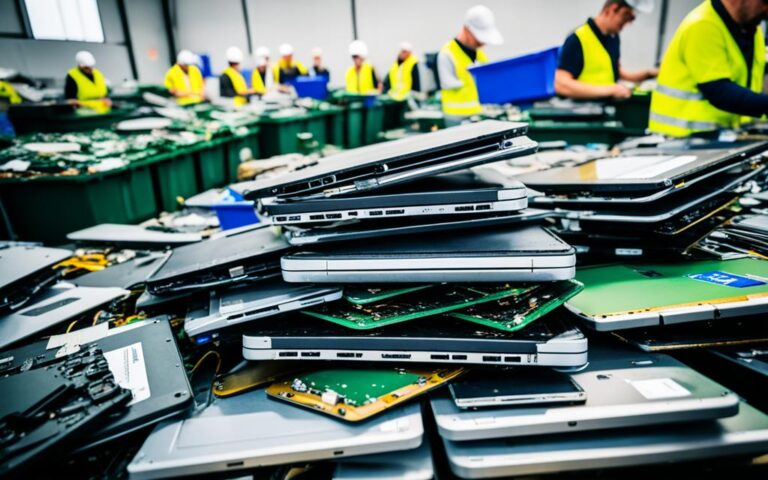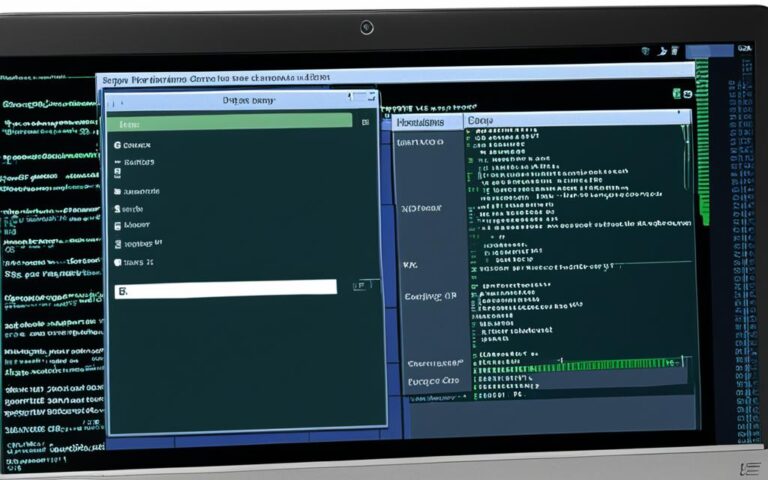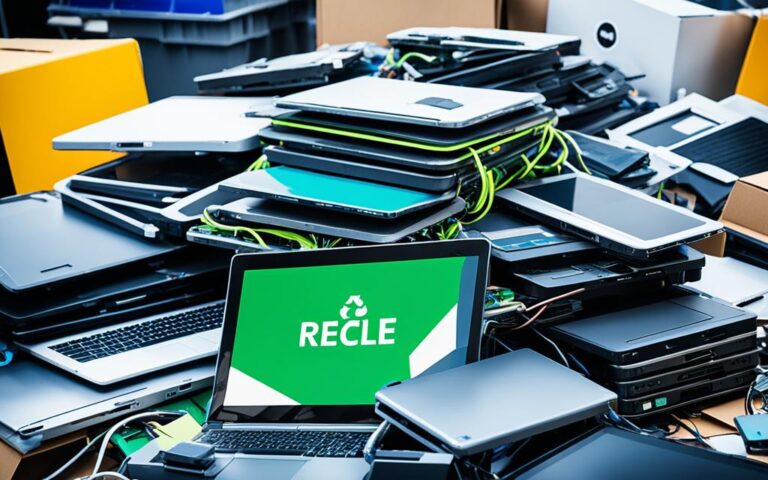Innovative Projects Powered by Recycled Laptops
In today’s world of constant technological advancements, sustainability has become a key concern. With the increasing demand for PCs during the pandemic, there has been a surge in unused older computers. However, these discarded laptops and desktops can still be put to good use through innovative projects.
Repurposing these recycled laptops not only reduces electronic waste but also drives sustainable technology. By making light upgrades and exploring alternative operating systems, these devices can be transformed into powerful tools with endless possibilities.
With a little creativity, these recycled laptops can be turned into media servers to serve up your favorite music, podcasts, and videos across multiple devices. Alternatively, they can be used as NAS home servers, providing network-attached storage for easy file sharing within your home or small business network.
Privacy-conscious individuals can even repurpose these laptops into anonymous workstations, utilizing privacy-focused operating systems that route internet traffic through the Tor network, ensuring a higher level of security.
If you have distant family members who need tech support, repurposing a recycled laptop as a starter PC can be a convenient solution. By setting up remote control programs, you can easily troubleshoot and update their PCs remotely, providing assistance from afar.
Innovative projects powered by recycled laptops not only benefit the environment but also foster creativity and innovation. From transforming them into guest or kitchen PCs, tablets, or even guitar amplifiers, the possibilities are endless.
Join the sustainability movement and explore the potential of recycled laptops. Embrace the tech advancements of the future while reducing electronic waste, one laptop at a time.
Experiment With a New, Lighter OS
One option for repurposing a recycled laptop is to experiment with a new, lighter operating system. Linux-based alternative OSes, such as Ubuntu, Mint, elementary OS, and Manjaro, offer interfaces similar to Windows and come with pre-installed software packages like LibreOffice. Another option is to create a Chromebook-like experience by installing Chrome OS Flex onto old PCs or Macs.
If you’re looking for a familiar interface and a wide range of software compatibility, Linux distributions like Ubuntu and Mint are excellent choices. These alternative OSes provide a user-friendly experience and a vast software ecosystem, allowing you to perform various tasks on your recycled laptop.
For those seeking a sleek and minimalistic design, elementary OS offers a beautiful interface reminiscent of macOS, making it an attractive option for individuals transitioning from Apple devices.
Manjaro, on the other hand, is known for its flexibility and robust package manager, enabling users to customize their Linux environment according to their needs and preferences.
Alternatively, if you prefer the simplicity and versatility of Chromebooks, you can transform your old PC or Mac into a Chromebook-like device by installing Chrome OS Flex. With Chrome OS Flex, you can enjoy the lightweight and secure Chromebook experience on your recycled laptop.
Experimenting with a new operating system not only breathes new life into your recycled laptop but also offers you the opportunity to explore different workflows and discover alternative software that can meet your needs.
Comparison of Linux Alternative OSes and Chrome OS Flex
| Operating System | Features | User Interface | Software Compatibility |
|---|---|---|---|
| Ubuntu | Extensive software library, customizable interface, regular updates. | Unity desktop environment resembling Windows. | Wide range of Linux software and compatibility with popular applications. |
| Mint | Beginner-friendly, stable and reliable, comprehensive software manager. | Cinnamon desktop environment with a familiar Windows-like interface. | Supports a vast selection of Linux software and popular applications. |
| elementary OS | Beautiful and intuitive design, streamlined user experience. | Pantheon desktop environment inspired by macOS. | Extensive software center and compatibility with Linux applications. |
| Manjaro | Rolling release model, easy installation of software, powerful package manager. | Xfce, KDE, or GNOME desktop environments with customizable layouts. | Supports a wide range of Linux software and popular applications. |
| Chrome OS Flex | Lightweight, secure, integrated with Google services. | Chrome OS interface with a focus on simplicity and online tasks. | Chrome web apps and compatibility with Android apps. |
Serve Up Some Media
Another innovative use for recycled laptops is to turn them into media servers. By installing software like Kodi or Plex, users can share and access their locally stored music, podcasts, and videos across multiple devices. These servers can be set up on devices running Linux, Windows, macOS, jailbroken iOS devices, rooted Android devices, or even a Raspberry Pi.
Setting up a media server allows users to create their own personal streaming service within their home network. With a media server, you can easily organize and curate your media collection, giving you convenient access to your favorite content whenever you want it.
“Having a media server is like having your own private entertainment platform. It eliminates the need for physical media storage and allows you to stream your favorite movies, TV shows, and music to any device within your home network.”
Whether you’re hosting a movie night in the living room or want to listen to your favorite music playlist in the bedroom, a media server gives you the flexibility to enjoy your media wherever and whenever you choose.
Benefits of Using Kodi
One popular media server software is Kodi. With Kodi, you can access and play media files from your laptop on a wide range of devices, including smart TVs, streaming devices, and smartphones. Here are some key benefits of using Kodi:
- Easily organize and browse your media library
- Supports a wide range of audio and video formats
- Customizable user interface with various themes and add-ons
- Ability to stream content from online sources, such as YouTube and Netflix
Benefits of Using Plex
Another popular media server option is Plex. Plex offers a user-friendly interface and a host of features that make it easy to manage and stream your media collection. Here are some key benefits of using Plex:
- Sleek and intuitive user interface
- Automatic organization and metadata retrieval for your media
- Ability to access your media remotely from anywhere with an internet connection
- Mobile apps for iOS and Android for on-the-go streaming
Comparison of Kodi and Plex
| Feature | Kodi | Plex |
|---|---|---|
| Customizable Interface | Yes | Yes |
| Streaming from Online Sources | Yes | Yes |
| Remote Access | No | Yes |
| Mobile Apps | Yes (Third-party apps) | Yes (Official apps) |
While both Kodi and Plex offer excellent media server capabilities, they have their strengths and cater to different user preferences. Choose the one that aligns best with your needs and enjoy the convenience of streaming and accessing your media collection across devices.
Turn Your Old PC Into a NAS Home Server
Repurposing a recycled laptop as a NAS home server allows users to store and share files with other devices on their home or small-business network. By utilizing open-source software like TrueNAS Core, Rockstor, FileCloud, or XigmaNAS, you can transform your old PC into a centralized storage server, eliminating the need to buy a separate NAS device.
Benefits of a NAS Home Server
Setting up a network-attached storage (NAS) system on your existing PC offers several advantages:
- Centralized storage: NAS allows you to consolidate all your files and media in one location, making it easily accessible to all devices connected to your network.
- File sharing: You can securely share files and collaborate with others by granting them access to specific folders or files on the NAS server.
- Backup solution: NAS provides a reliable backup solution for your important data. You can configure automated backups and ensure the safety of your files.
- Media streaming: With a NAS home server, you can create your own media library and stream music, videos, and photos to various devices within your network.
To get started, you’ll need to choose the right NAS software based on your requirements and technical expertise. Let’s explore some popular options:
| NAS Software | Description |
|---|---|
| TrueNAS Core | An enterprise-grade NAS platform built on FreeBSD. It offers advanced storage features, high reliability, and robust security. |
| Rockstor | A Linux-based NAS solution that provides a user-friendly web interface for easy management and configuration. |
| FileCloud | A cloud-like file sharing and sync platform that can be used both on-premises and in the cloud. |
| XigmaNAS | A lightweight NAS solution based on FreeBSD, known for its simplicity and compatibility with various hardware configurations. |
Regardless of which NAS software you choose, the installation process typically involves downloading the software, creating bootable media, and following the setup wizard. Once configured, you can access your NAS home server through a web interface or dedicated client software.
With your NAS home server up and running, you can start taking advantage of its features and capabilities. Whether it’s storing and sharing files, backing up important data, or streaming media, your recycled laptop can find new life as a versatile storage hub within your network.
Hack Together an Anonymous PC
Concerned about privacy? Recycled laptops can be transformed into anonymous workstations by using The Amnesic Incognito Live System (TAILS) or other privacy-focused Linux distros like Whonix and Qubes OS. These operating systems route internet traffic through the Tor network, ensuring a higher level of privacy and security.
“By using privacy-focused operating systems on recycled laptops, users can safeguard their online activities and protect sensitive information. The Amnesic Incognito Live System (TAILS) is designed to leave no traces on the computer it runs on, providing users with a secure and anonymous browsing experience. Whonix, on the other hand, offers a highly compartmentalized environment that separates the user’s activities from the underlying operating system. And for those who prioritize security over convenience, Qubes OS provides a unique approach by isolating different tasks in separate virtual machines, allowing users to create a truly anonymous and secure computing environment.”
Privacy with The Amnesic Incognito Live System (TAILS)
-
Tails is a popular choice among privacy enthusiasts and journalists who require a secure and anonymous operating system. It routes internet traffic through the Tor network, making it difficult to trace online activities back to the user. Tails can be easily installed on a recycled laptop, providing a bootable USB experience that leaves no traces behind on the host system.
-
With Tails, users can browse the web anonymously, access blocked websites, communicate through encrypted channels, and securely handle sensitive information. Its built-in tools and applications, such as the Tor Browser, GnuPG, and the Electrum Bitcoin wallet, further enhance privacy and security.
-
Tails also implements additional security measures, such as a secure memory erasure feature that wipes sensitive data from the RAM when shutting down the system. This ensures that no residual information is left behind, protecting user privacy.
To download Tails and learn more about its features, visit the official Tails website.
Whonix: Enhanced Anonymity and Security
Another privacy-focused Linux distro is Whonix, which provides robust security and enhanced anonymity for users looking to protect their online activities. Whonix operates using a unique dual-VM architecture that separates the user’s activities from the underlying operating system.
-
The first virtual machine, called Whonix-Gateway, acts as a Tor gateway and routes all internet traffic through the Tor network. This ensures that the user’s IP address remains hidden and their online activities are anonymized.
-
The second virtual machine, known as Whonix-Workstation, provides a secure and isolated environment for web browsing, email communication, and other online tasks. Any malicious software or attacks are confined to the workstation, protecting the host operating system and user data.
-
Whonix also incorporates several built-in security measures, including mandatory access controls and daily updates to patch vulnerabilities and address emerging security threats. These features offer users peace of mind and a comprehensive defense against online threats.
To learn more about Whonix and start using this privacy-oriented operating system, visit the official Whonix website.
Qubes OS: Secure Compartmentalization
For users who prioritize both privacy and security, Qubes OS provides a unique approach to anonymous computing. Qubes OS uses virtualization to create separate compartments, called qubes, that isolate different tasks and prevent them from interfering with each other.
-
Each qube can be dedicated to a specific activity, such as web browsing, file management, or communication. By separating tasks into different qubes, the risk of cross-contamination and data leaks is significantly reduced.
-
All qubes in Qubes OS run on a secure hypervisor, ensuring that even if one qube is compromised, the others remain isolated and unaffected. This provides a high level of security and protects user data from vulnerabilities and attacks.
-
In addition, Qubes OS supports disposable qubes, which are temporary and disposable environments that can be used for tasks requiring an extra layer of security. Disposable qubes are automatically destroyed after use, further enhancing confidentiality and privacy.
To explore Qubes OS and its advanced security features, visit the official Qubes OS website.
With the use of The Amnesic Incognito Live System (TAILS), Whonix, or Qubes OS, recycled laptops can be repurposed into anonymous workstations that prioritize privacy and security. By leveraging the Tor network and adopting these privacy-focused operating systems, users can browse the web, communicate, and handle sensitive information without compromising their privacy. Don’t let your old laptop go to waste—give it a new purpose as an anonymous PC.
Create a Starter PC for Distant Family
Repurposing a recycled laptop as a starter PC for family members who need tech support from afar can be a great solution. By reinstalling Windows, creating separate user accounts, and setting up remote control programs like TeamViewer or Microsoft Remote Desktop Connection, users can provide assistance and perform updates on the PC remotely.
Setting up a family PC that allows for troubleshooting and remote access not only provides convenience but also promotes efficient problem-solving and prevents the need for physical intervention. Whether it’s guiding a family member through a software installation or troubleshooting a technical issue, having remote access to their PC can save time and ensure a smoother experience.
To create a starter PC for your distant family members, follow these steps:
- Reinstall Windows: Begin by wiping the laptop’s hard drive and performing a fresh installation of Windows, ensuring that the operating system is up to date. This process will provide a clean slate for your family member to work with.
- Create Separate User Accounts: Set up individual user accounts on the PC, each tied to a specific family member. This segregation will allow for personalized settings and data management while maintaining privacy and security.
- Install Remote Control Software: Download and install remote control programs like TeamViewer or Microsoft Remote Desktop Connection. These tools enable you to access the family PC remotely, with their permission, giving you the ability to troubleshoot issues, perform updates, or guide them through various tasks.
With a family PC equipped with remote access capabilities, distance is no longer a barrier to providing tech support. You can now lend a helping hand to your distant family members, ensuring their devices are optimized, secure, and user-friendly. Troubleshooting and maintaining their PCs remotely not only saves time but also fosters a sense of connectedness and support, even when physically apart.
Conclusion
Repurposing older laptops and desktops can play a crucial role in reducing electronic waste and promoting sustainability in the UK. By exploring innovative projects and embracing the potential of recycled laptops, we can drive the advancement of sustainable technology.
Through repurposing, these older devices can find new life and serve a variety of purposes. By exploring alternative operating systems and software, we can transform these laptops into media servers, NAS home servers, or even anonymous PCs. This enables us to maximize their potential and minimize their impact on the environment.
Furthermore, repurposing recycled laptops allows us to create starter PCs for distant family members, providing them with access to technology while reducing the need to purchase new devices. Additionally, these laptops can be transformed into guest or kitchen PCs, tablets, or even guitar amplifiers, unleashing our creativity and adding value to these devices.
By repurposing recycled laptops, we not only extend their lifespan but also contribute to a more sustainable future. Through these innovative projects and initiatives, we can harness the power of technology while minimizing our environmental footprint. Let us embrace the potential of repurposed laptops and work towards a more sustainable and innovative future in the UK.
FAQ
How can I repurpose a recycled laptop?
Recycled laptops can be repurposed in various ways, such as experimenting with a new operating system, turning them into media servers, NAS home servers, anonymous PCs, starter PCs for family members, and more.
What operating systems can I try on a recycled laptop?
You can explore Linux-based alternative operating systems like Ubuntu, Mint, elementary OS, and Manjaro. Alternatively, you can create a Chromebook-like experience by installing Chrome OS Flex.
How can I use a recycled laptop as a media server?
Install software like Kodi or Plex on the recycled laptop to share and access locally stored music, podcasts, and videos across multiple devices within your home network or small-business setup.
Can I use a recycled laptop as a NAS home server?
Yes, you can repurpose a recycled laptop as a NAS home server by installing open-source software like TrueNAS Core, Rockstor, FileCloud, or XigmaNAS. This allows you to store and share files with other devices on your network without the need for a separate NAS device.
How can I ensure privacy on a recycled laptop?
You can transform a recycled laptop into an anonymous workstation by using The Amnesic Incognito Live System (TAILS) or privacy-focused Linux distributions like Whonix and Qubes OS. These operating systems route internet traffic through the Tor network, providing a higher level of privacy and security.
Can I repurpose a recycled laptop as a starter PC for family members?
Absolutely! Reinstall Windows, create separate user accounts, and set up remote control programs like TeamViewer or Microsoft Remote Desktop Connection. This allows you to provide tech support and perform updates on the recycled laptop remotely, making it an ideal solution for family members who need assistance from afar.
What are the benefits of repurposing a recycled laptop?
Repurposing a recycled laptop not only reduces electronic waste but also drives sustainability and innovation. It empowers you to explore alternative uses for technology, create valuable tools, and contribute to a more environmentally friendly world.













